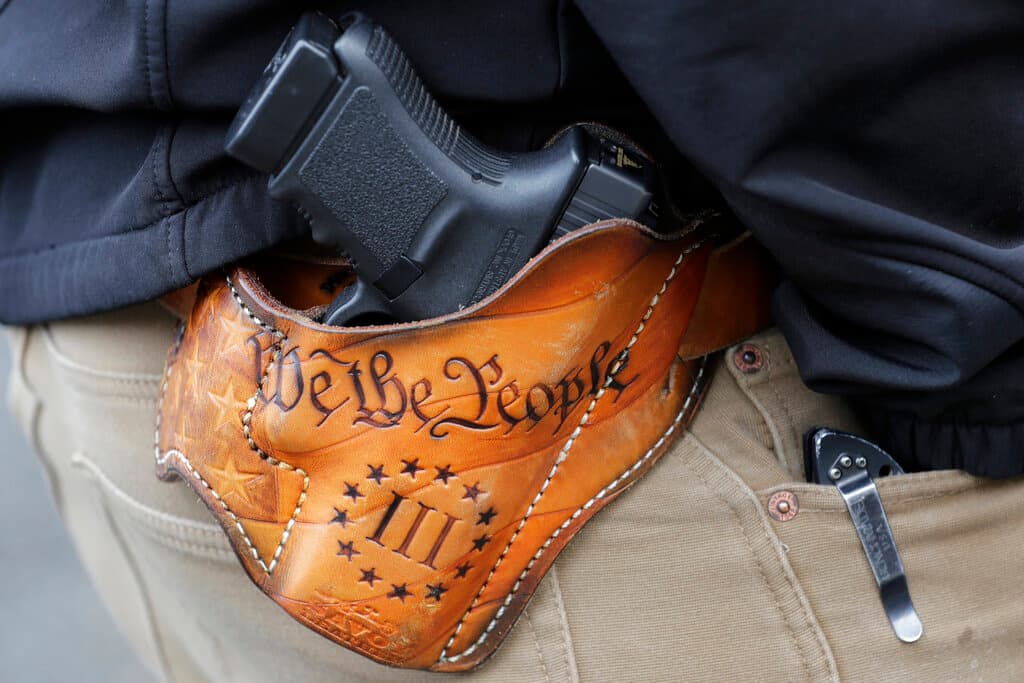North Carolina Legislature Overrides Democratic Governor’s Veto of Gun Permit Bill
Citizens of North Carolina will now be able to purchase a gun without getting permission from their local sheriff.

The North Carolina state legislature voted successfully on Wednesday to override Governor Cooper’s veto of a new state law that will roll back a Jim Crow-era gun law conservatives have branded as racist.
Under longstanding North Carolina law, a firearms permit applicant must go through both federal and county-level background checks, giving local sheriff’s departments the ability to deny permit applications arbitrarily. Both Republicans and Democrats have said it is an infringement on citizens’ Second Amendment rights. When the bill repealing county background checks originally passed in February, three Democrats voted for the measure.
Mr. Cooper vetoed the bill on Friday. In a statement, he said the county-level background check helps to keep firearms out of the hands of violent individuals.
“Eliminating strong background checks will allow more domestic abusers and other dangerous people to own handguns and reduces law enforcement’s ability to stop them from committing violent crimes,” Mr. Cooper said. “Second Amendment supporting, responsible gun owners know this will put families and communities at risk.”
Republicans sold their legislation as a remedy to the state’s “racist” gun permitting laws of the past. The requirement that sheriffs sign off on gun permits dates back to the Jim Crow era, and critics of the county-level background check say the law was passed in order to arbitrarily deny Black men permits to own firearms.
A Republican state representative, Jeff McNeely, told local affiliate CBS17 that he wanted to repeal the law so that North Carolinians of all races can better defend themselves. “You can go and look at the gun registry there and try to trace that lineage” to check the race of those who were granted permits, he said. “I think you’d find very, very few” Black permit holders.
One North Carolina sheriff — who himself is Black — agrees with Mr. McNeely’s assessment of the law, but believes it should stay in place. “Sure the law was racist in 1919,” the Mecklenburg County sheriff, Garry McFadden, said. “But now, we’re here, and now saying allow the sheriff to do their job.”
On Tuesday, North Carolina’s state senate overrode the veto by a vote of 30 to 19. In the 50-member body, veto overrides require three-fifths supermajority support. The House followed suit on Wednesday morning by a vote of 71 to 46, with three Democrats not voting.
Republicans were criticized for overriding the governor’s veto just one day after a school shooting at Nashville left three children, three adults, and the perpetrator dead.
The state attorney general, Democrat Josh Stein, said in a statement that children will be put at risk with this veto override. “Too many worry that their kids may not come home from school,” he wrote. “Gun violence is a terrifying threat, and eliminating background checks will make the job of law enforcement officers more difficult. While our legislators failed us, I’ll continue to do everything in my power to keep people in our state safe.”
The executive director for the Duke University Center for Firearms Law, Andrew Willinger, said the law might have had the effect of stopping Black firearms ownership, but was not explicitly written to bar Black citizens from owning guns.
“My suspicion is that the law was being applied differently in different places across the state,” he said.
A study from two Clemson University economists found that Black Americans were far less likely to be lynched during the Jim Crow era if they owned firearms. “State bans on pistols and increases in white law enforcement personnel served as mechanisms to disarm the Black community, while having no comparable effect on white-owned firearms,” they wrote.

